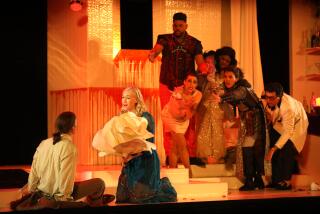Purity, Smoothness of Battle’s Voice Please, Despite Mannerisms
Philosophers may ponder the order of the chicken and the egg, but at soprano Kathleen Battle’s Royce Hall recital Saturday, a more pressing question was: Which comes first--the singer or the song?
Ideally, the two should be inseparable. But here, romantic songs and airs by rather diverse composers sounded much alike, as Battle’s charismatic and distinctive singing subsumed all under a single stylistic mantle.
With edge-less, silken tone caressingly applied to everything, the veteran American diva seemed in fine and characteristic voice. Yet she had substantial pauses between each number to clear her throat and concentrate; she broke off Donizetti’s “O Luce di Quest Anima” in mid-flight and relaunched it, and by the end of the program she had a mug of something and an inhalant with her onstage.
Whatever that indicated about Battle’s vocal condition was not apparent in most of her singing. The purity of her sound was engaging in Mozart’s little arietta “Dans un Bois Solitaire” and the later “Als Luise die Briefe” and “An Chloe,” while the mannered seduction of her phrasing charmed most in Faure’s “Re^ve d’Amour,” “Les Roses d’Ispahan” and “Notre Amour,” and Villa-Lobos’ magnificently sultry “Melodia Sentimental.” Ted Taylor, sonically remote with the lid of the piano open just a crack, provided murmurous and deferential accompaniment.
Turina’s “Tu Pupila es Azul,” with its echo of the earthy cry of a flamenco cantaora, suffered the most from Battle’s ultra-smooth delivery, slow tempos and tendency to tug at rhythms. She restarted Strauss’ “Madchenblumen” when a member of the audience fainted and had to leave after the first of the four songs, but her own lengthy pauses fractured the unity of the cycle.
In contrast to the coy raptures of these songs, Battle opened with the heroic Georgian dignity of airs from Handel’s “Theodora” and “Semele.” It was opera, though, that got her large and attentive audience whooping. The Donizetti showpiece from “Linda di Chamounix” sounded vividly flirty both times around, although the second time Battle ditched some of the high notes in her cadential elaborations. In encore she sang Rossini’s “Una Voce Poco Fa” with equally bright characterization.
Battle closed her program with a set of spirituals, five unaccompanied and “He’s Got the Whole World” with Taylor back at the piano. The combination of operatic vocal production with gospel phrasing can be disconcerting, and the calculated histrionics of her physical gestures often undercut the sincerity of her voice, but close your eyes and that wonderfully gliding voice could be overwhelming in “Were You There?”
More to Read
The biggest entertainment stories
Get our big stories about Hollywood, film, television, music, arts, culture and more right in your inbox as soon as they publish.
You may occasionally receive promotional content from the Los Angeles Times.










